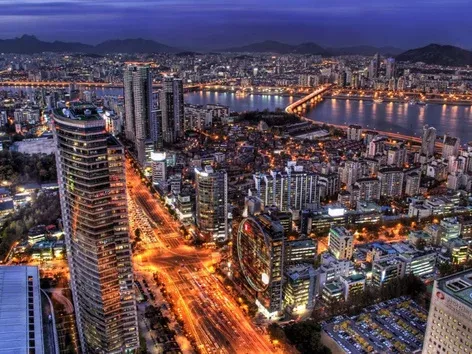High-level visa in South Korea: who can get a new Korean visa and what are the benefits of the permit?

South Korea is introducing a new “High-Level Visa” to attract foreign professionals in the fields of technology and science. Find out who can get this visa, what benefits it provides, and what other migration programs the government plans to introduce in 2025
South Korea is set to introduce a new “High-Level Visa” program that will attract highly skilled professionals from Tajikistan, Turkmenistan, Uganda and other countries to advanced sectors of the Korean economy, such as artificial intelligence, semiconductors and biotechnology. The initiative aims to strengthen the country’s technological competitiveness and address demographic challenges by attracting the best talent from around the world.
This article explains what requirements foreigners must meet to obtain a visa and what its benefits are.
To safely move and find work in a new country, you will need health insurance. Apply for an extended policy on the Visit World portal.
Who can get a Korean “High-Level Visa”?
To qualify for a high-level visa, applicants must meet the following criteria:
- Education
Have a master’s or doctoral degree from one of the world’s top 100 universities.
- Professional Experience
Demonstrate at least three years of experience working for one of the world’s top 500 companies.
- Secure a job with a suitable salary level
According to the requirements, you must secure a position with a salary level of approximately US$97,000 (140 million won) or higher from a South Korean employer.
The specifics of the program, such as the criteria used to determine the best schools, will be announced later when the visa is officially launched, which is expected to be in the coming weeks.
What are the benefits of the Korean “High-Level Visa”?
To attract and retain top talent, the Korean High-Level Visa offers a wide range of benefits:
- Flexibility in residence and employment
Holders of the “High-Level Visa” and their family members will receive an F-2 residence permit, which will allow them to live and work in South Korea for three years.
After this period, foreigners will be eligible to apply for permanent residence.
- Fast-track visa processing
The visa application process has been simplified, which will help speed up the visa issuance process electronically without the need to visit embassies or immigration offices.
- Moving with family
Visa holders can bring their spouse, minor children, and even parents to South Korea. In addition, children of visa holders are allowed to attend international schools without typical enrollment restrictions.
- Settlement assistance
Customer-oriented services will be provided to assist with moving to South Korea, including support with banking, telecommunications, and registration processes.
Tax Benefits of the K-Tech Pass for High-Level Visa Holders
A key benefit of the High-Level Visa Program is its alignment with the Ministry of Trade, Industry and Energy’s K-Tech Pass initiative, which offers additional financial incentives:
1. Income Tax Reduction
Visa holders will receive a 50% income tax exemption for ten years, significantly reducing their financial obligations.
2. Access to Home Loans
The program expands access to home loans by offering limits similar to those available to Korean citizens, with loans up to KRW 500 million.
3. Research and Academic Opportunities
Special research funding and academic opportunities are available to biotechnology professionals, fostering collaboration and innovation in the industry.
By introducing a high-level visa and its associated benefits, South Korea aims to create an optimal environment for foreign experts to thrive, thereby strengthening the country’s position as a global hub for technology and innovation. For skilled foreigners, this permit is a good way to move to the country permanently.
How else is South Korea planning to attract foreign workers?
In addition, to make South Korea a more attractive destination for young foreign workers, the government plans to issue D-10 visas to graduates of top university academic programs, allowing them to freely seek job opportunities in the country for two years.
Also, to attract young workers from other countries, the government will introduce a “youth dream visa,” which will allow “young citizens of friendly countries” to receive vocational training and take advantage of internship opportunities and possibly employment here.
To learn the Korean language, culture, and legal system, the government will strengthen assimilation programs, especially for young foreigners.
When will the new visa programs in South Korea start operating?
Visa issuance is planned to begin in the second half of this year, once local governments complete the development of the program in the second quarter.
Order a consultation with a migration lawyer to learn the current rules for moving and working in South Korea in 2025.
Reminder! From February 24, 2025, South Korea introduced an electronic arrival card, which replaces traditional paper forms for travelers. This initiative is aimed at simplifying the entry process and increasing the efficiency of immigration procedures. We have already told you what a Korean electronic arrival card is, who needs it and how to apply for it.
Products from Visit World for a comfortable trip:
Checklist for obtaining a visa and necessary documents in South Korea;
Legal advice on immigration to South Korea;
Travel insurance for foreigners in South Korea;
Medical insurance all over the world.
We monitor the accuracy and relevance of our information. Therefore, if you see any error or discrepancy, please write to our hotline.
Recommended articles
2 min
Residence permit
EU Blue Card: requirements and registration procedure in 2025
EU Blue Card – a residence and work permit for highly qualified specialists in the European Union countries. In 2025, the EU announced significant changes to the EU Blue Card program, aimed at simplifying employment and life for highly qualified specialists from all over the world. Find out what benefits the card provides, which countries issue it, the requirements that must be met to obtain a permit, as well as the package of documents for obtaining a permit
10 mar. 2025
More details3 min
Pros & Cons
Pros and cons of living in South Korea: what is important for expats to know?
Life in South Korea will provide expats with many opportunities, but it also comes at a price. When planning to move here, you should be prepared for certain advantages and disadvantages. Find out what are the pros and cons of living in South Korea and what to pay attention to when planning a move to the country
28 gru. 2025
More details1 min
Travels
South Korea has announced that it will extend the K-ETA exemption for citizens of 67 countries until the end of December 2025. Find out how the simplification of migration legislation will affect travelers from countries exempted from the K-ETA and the current entry rules
22 gru. 2024
More details1 min
Travels
South Korea is considering a pilot program that would allow Chinese tour groups to enter without visas. The main goal of this measure is to stimulate tourism and further promote South Korea's economic growth. Find out what is already known about visa-free travel from China to South Korea
01 sty. 2025
More detailsAll materials and articles are owned by VisitWorld.Today and are protected by international intellectual property regulations. When using materials, approval from VisitWorld.Today is required.
